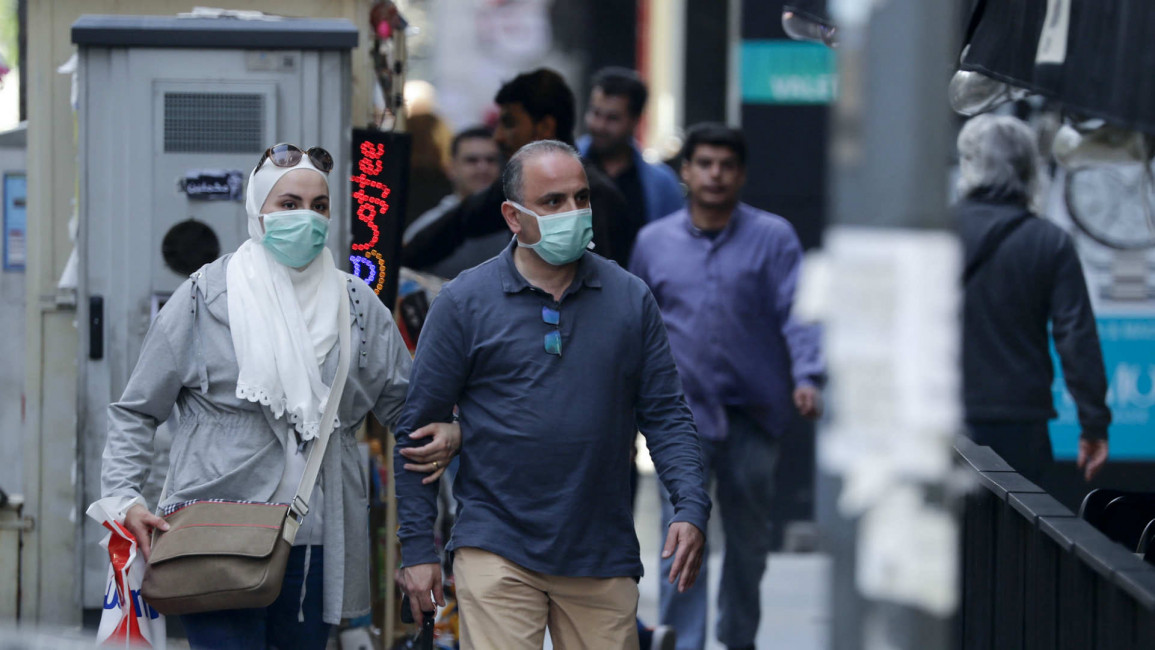Lebanon reimposes coronavirus restrictions after surge in infections
Lebanon reimposes coronavirus restrictions after surge in infections
Lebanon reimposed Covid-19 restrictions for the next two weeks as the country experiences a surge in cases.
2 min read
The new lockdown procedures were announced as Muslims anticipate Eid Al-Adha on Friday [AFP]
Lebanon on Monday imposed a two week Covid-19 lockdown amid a spike in infections, the health ministry announced, as the country simultaneously battles its worsening economic crisis.
Places of worship, cinemas, bars, nightclubs, sports events and popular markets will be shut down, Reuters reported.
Medical establishments, industrial and agricultural firms, and critical government functions will remain open.
Educational institutions, banks, shops and private companies will be permitted to open only on Tuesdays and Wednesdays.
A near total lockdown will be implemented from Thursdays to Mondays until 10 August.
The renewed lockdown procedures were announced as Muslims anticipate Eid Al-Adha on Friday, a celebration which normally sees large family gatherings.
Lebanon's Health Minister Hamad Hassan warned the virus was beginning to take a "dangerous turn", blaming the spate in cases on a "lack of community discipline and disregard for all preventive measures imposed on people", according to Arab News.
Lebanon's early lockdown and strict measures to contain the virus were praised for slowing down the initial spread of the pandemic. Authorities have also aggressively tested, carried out random tests, and swiftly isolated infected areas.
Lebanon's economic and financial crisis predates the virus, which has only accelerated poverty and unemployment rates. In late April, the authorities began gradually easing weeks-long restrictions that threw tens of thousands out of work.
Before the coronavirus, a highly indebted Lebanese government bailed on paying its sovereign debt in March, while banks imposed informal capital controls to prevent the further drying up of liquidity and foreign currency.
Nationwide protests demanded major reforms from a government that has failed to gain wide domestic or international support while talks for assistance from the International Monetary Fund stalled.
The crisis put a strain on resources and threatened fuel supplies, which raised alarm among the country's hospitals that rely on generators and fuel bought at black market rates.
Follow us on Facebook, Twitter and Instagram to stay connected
Medical establishments, industrial and agricultural firms, and critical government functions will remain open.
Educational institutions, banks, shops and private companies will be permitted to open only on Tuesdays and Wednesdays.
A near total lockdown will be implemented from Thursdays to Mondays until 10 August.
The renewed lockdown procedures were announced as Muslims anticipate Eid Al-Adha on Friday, a celebration which normally sees large family gatherings.
Beirut's airport, border crossings with Syria and sea ports will remain open, though travellers arriving from high-risk countries will be held in quarantine for 48 hours pending coronavirus test results.
Lebanon has experienced a surge in Covid-19 cases, with at least 132 new infections in the past 24 hours. Lebanon has recorded 51 deaths in total from the virus. |
| [Click to enlarge] |
Lebanon's Health Minister Hamad Hassan warned the virus was beginning to take a "dangerous turn", blaming the spate in cases on a "lack of community discipline and disregard for all preventive measures imposed on people", according to Arab News.
Lebanon's early lockdown and strict measures to contain the virus were praised for slowing down the initial spread of the pandemic. Authorities have also aggressively tested, carried out random tests, and swiftly isolated infected areas.
Lebanon's economic and financial crisis predates the virus, which has only accelerated poverty and unemployment rates. In late April, the authorities began gradually easing weeks-long restrictions that threw tens of thousands out of work.
Before the coronavirus, a highly indebted Lebanese government bailed on paying its sovereign debt in March, while banks imposed informal capital controls to prevent the further drying up of liquidity and foreign currency.
Nationwide protests demanded major reforms from a government that has failed to gain wide domestic or international support while talks for assistance from the International Monetary Fund stalled.
The crisis put a strain on resources and threatened fuel supplies, which raised alarm among the country's hospitals that rely on generators and fuel bought at black market rates.
Follow us on Facebook, Twitter and Instagram to stay connected



